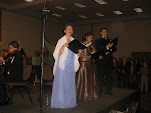I always keep two things in mind when doing the initial "warm-up" with the student (new or experienced) First, I use a simple descending five-note scale, and second, I am sure to start the scale just above the typical register shifts for men or women. Each voice will be different and you can adjust the starting point for students as you get to know them. It is safe to start men a little below Middle C (C5), like around A4; and women C above Middle C (C6). By starting in these ranges, it can prevent the student from starting off singing in a belt or "chest" register. Using a descending scale will give the student the opportunity to stay in "head" voice longer. Also, singing descending warm-ups tends to be more relaxing and tension-free, opposed to the vocal stresses of singing high. I tell the student to do the best they can and that we will go down the scale, and I demonstrate the scale. I use an "ah" vowel, with a possible consonant of choice at the beginning. I allow the student to sing as low as sounds comfortable, and make a note of the lowest pitch.
Next, I discover the high range of the voice. Most new students will be a little nervous about this part- even those with higher voices. I tell the student to relax and do the best they can, and try to go as high as possible- not to worry about creaks and cracks and squawks- just go for it! For this part, I choose a simple three note arpeggio (do mi sol mi do), or a shorter version (for less experiences singers) of do mi do or do sol do. Again, an "ah" vowel is good, usually with no initial consonant. I start this exercise somewhere in the mid range, (a little below the starting point for the descending exercise) and encourage the student to go as high as they can- even if they don't think the sound is very pretty. (Watch for "I can't sing that high!")
At this point, you should be able to know at least three things that you will need to work on with the student to improve singing. Be sure to talk to the student about the good things you hear. (Strong low range, lovely tone etc) and then to talk about some deficiencies. (After all, they came to you for help!) and how you plan to work with the student to improve those deficiencies.
If time allows on the first lesson, I discuss support and breathing. I start by asking the student what his or her perception is or knowledge of breathing and support for singing. It is important to know what the student has been taught (or not taught) about proper support for singing so that you can elaborate upon what they know, or correct any misconceptions. (Watch for "The Diaphragm Dilemma). I also believe it is important to explain how the body works during the process of breathing. After explaining this, I will give the students some breathing exercises to work on and get acquainted with.
I may or may not assign a piece of music at the first lesson. This depends upon the time and experience level of the student. Some students are overwhelmed enough with the first lesson, and will need small steps to start out with. Others may be eager to start on repertoire and may even have brought some of their own music to start with. Sometimes it takes a lesson or two to get to know the ability level of the student, and to get to know the student's personality. That's right, I said personality. It's important to try to understand the student's character, energy level and desires when choosing music. The music that the student studies should be first a song that will ultimately be able to help the student improve his/her vocal studies in general. Second, it should be something that the student finds interesting. If a student does not have an investment in the music- if it doesn't "speak" to them, (or in this case, "sing") then they will most likely not practice it. This doesn't mean that the teacher should always assign music that the student already knows or likes, but that the teacher should be able to gauge if the student seems enthused enough to work on a song-especially on the first lesson. (More about repertoire choice later.)
When the time is up, be sure to summarize what you talked about, and be specific about expectations for the weekly practicing assignment. Also, discuss how much you expect the student to practice weekly. Be realistic in how much time you ask a student to practice. To be honest, high school students these days are packed with things to do, and even expecting an hour a day can be overwhelming. I also ask the student if there are any questions, and tell them that if they have any questions that they can call or e-mail me.
Thus ends The First Lesson.
I welcome and questions, comments or suggestions. Also... you can take the poll!
-Danielle




No comments:
Post a Comment